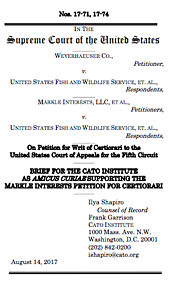In response to the FWS’s overreach, Markle — and others with interest in the designated property — filed suit in a Louisiana federal district court. Markle argued that, for the agency to designate its property as “essential critical habitat,” it must actually be habitat of the species. The FWS’s definition of what constitutes “essential” habitat of the frog was unreasonable because the frog has no connection to the land. Finally, Markle argued that if the FWS’s interpretation of the ESA stands, it would expand the FWS’s power to regulate “economic activities” beyond the federal government’s jurisdiction under Commerce and Necessary and Proper Clauses of the Constitution. Although the district court found the designation to be “harsh,” it deferred to the agency’s interpretation of the ESA, and further held that, because the designation was part of a “comprehensive economic scheme” (that is, the entire Endangered Species Act), the federal government had not gone beyond its constitutional jurisdiction. Markle appealed to the U.S. Court of Appeals for the Fifth Circuit, but the three-judge panel affirmed the district court’s holding 2–1. Markle then asked the Fifth Circuit to review the case en banc — where all of the Fifth Circuit judges would rule on the FWS’s interpretation — but the court denied the landowners’ request, again over a dissent. Markle has now petitioned the Supreme Court to hear its case.
Cato has filed an amicus brief in support of their petition. We argue that granting Chevron deference in this case was inappropriate because the ESA’s plain meaning requires designated property to be a species’ “habitat.” Moreover, the FWS’s interpretation of “essential” habitat is unmoored from all bounds of reason. As noted, the frog does not live on the land, the land does not contain the environmental conditions required for the frog to survive on the land, and the land will never sustain the frog without significant alteration by the landowners. Thus, the FWS has interpreted — more like rewritten — the ESA to enlarge its power to reach property Congress never gave it power to reach. This aggrandizement of the FWS’s power will have major economic and political consequences for landowners throughout the United States.
What’s more, the FWS’s interpretation doesn’t just stretch Chevron deference to the breaking point, it oversteps constitutional limits. Property in-and-of-itself has never been regulated as an “economic activity” that can be regulated under the Commerce Clause — it is only the activities that take place on the land that may be regulated. Under the Necessary and Proper Clause, regulating Markle’s land is not necessary to the ESA — or any species it covers, including the frog at issue in this case — because the land has no connection to the species. And it is not proper to assert jurisdiction over land with no connection to a species under the commerce power, because if that is case, the federal government will have almost limitless power to regulate land-use — a power that is reserved to the states under the Constitution. This case represents significant disregard for the structural protections in the Constitution. The Supreme Court should grant review.



